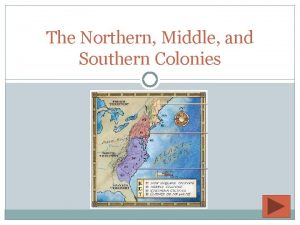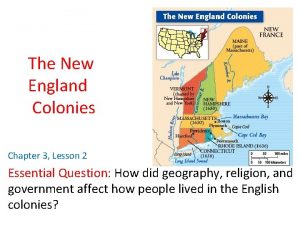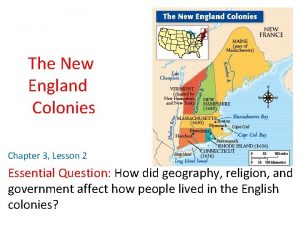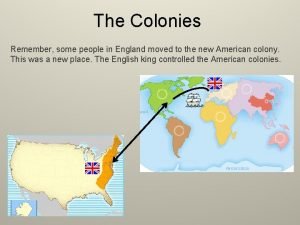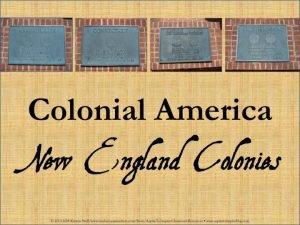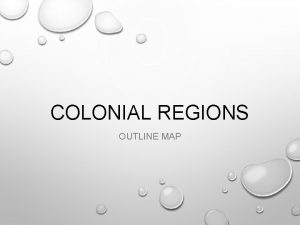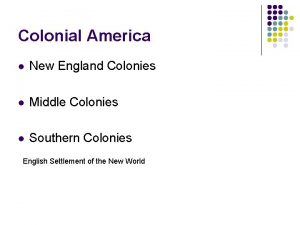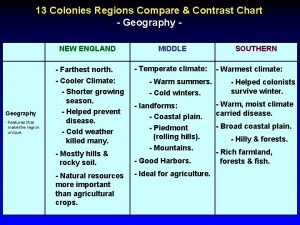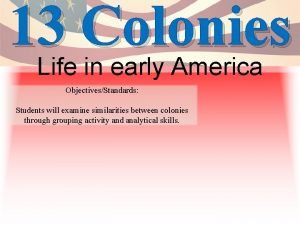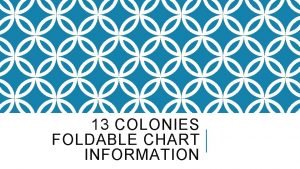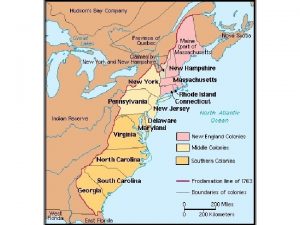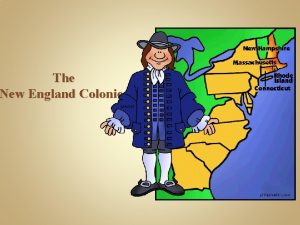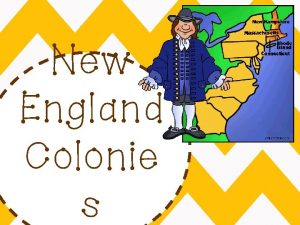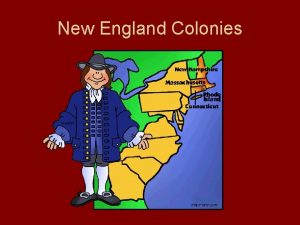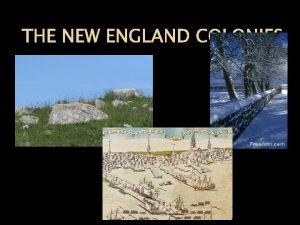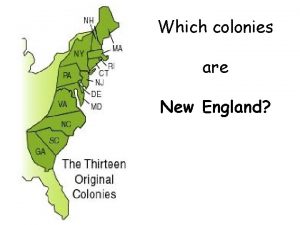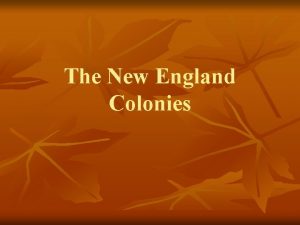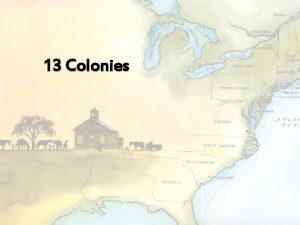The Colonies Northern New England New Hampshire Massachusetts











- Slides: 11

The Colonies • Northern (New England): New Hampshire, Massachusetts, Rhode Island, Connecticut • Middle: New York, New Jersey, Pennsylvania, Delaware • Southern: Maryland, Virginia, North Carolina, South Carolina, Georgia

Northern Colonies • Geography: Atlantic Coastline, thin rocky soil, some land for cattle • Economy: fishing, whaling, lumber, ship building, subsistence farming • People/Society: – Puritans- extremely religious but all still have a voice in town – Other Puritans left for religious freedom and separation of church and state (RI)

Middle Colonies • Geography: Fertile land for farming • Economy: Wheat is cash crop. – Other businesses: glass & pottery, grist mills produced flour • People/Society: Colonies supported religious freedom – Pennsylvania founded by William Penn

Southern Colonies • Geography: Farmland plantations, NC’s coastline made it difficult to settle • Economy: Tobacco, deer skin & rice (SC), plantation farming reliant on indentured servants and enslaved Africans • People and Society: Proprietary colony (VA), Religious tolerance to all Christians (MD), GA was a debtor’s colony

As a group: analyze the chart a) b) c) d) e) Each person writes their own response on the back of his/her chart What are the major similarities and differences between regions? Describe how geography influenced each region What are the pros/cons (positive/negatives) of having 3 distinct colonial regions? How do these distinct regions influence historical events? Describe regional differences that still exist today.

What caused Bacon’s Rebellion? • A land shortage began to develop in the 1670’s. • Indentured Servants and backcountry farmers wanted land of their own, but land that was left belonged to the Native Americans • Plantation owners opposed expansion because they did not want war with N. A. to destroy their plantations

What outcome did the rebellion have on Virginia? • The rebellion convinced many wealthy planters that land should be made available to the backcountry farmers- regardless of the impact on N. A. • Increased VA’s reliance on enslaved Africans instead of indentured servants – Enslaved workers did not have to be freed and therefore would never need their own land.

Describe the triangular trade. • Exchange of goods among the colonies, England, Caribbean sugar planters and Africa. • This system brought great wealth to merchants, who began to build factories. • Large cities developed and a class system also emerged with the merchants who controlled the trade at the top.


Discrimination in the colonies: Enslaved Africans & Jews • Enslaved Africans: Slave codes kept African captives from owning property, receiving and education, moving about freely or meeting in large groups. • Jews: Were allowed to worship freely, but could not vote or hold public office.

Discrimination in the colonies: Women • Women: Did not have equal rights. – Married women could not own legal property or make contracts or wills. – Husbands sole guardians of children – Single women and widows had more rights: • Own and manage property, file lawsuits and run businesses.
 When was the new england colonies founded
When was the new england colonies founded Where is plymouth
Where is plymouth Lesson 2 the new england colonies answer key
Lesson 2 the new england colonies answer key The northern colonies
The northern colonies New england colonies leaders
New england colonies leaders 13 colonies outline map
13 colonies outline map L
L Facts about the new england colonies
Facts about the new england colonies First 13 states
First 13 states 13 colonies chart
13 colonies chart Interesting facts about the middle colonies
Interesting facts about the middle colonies 13 colonies foldable
13 colonies foldable
